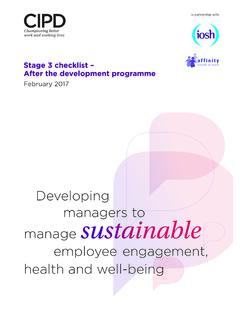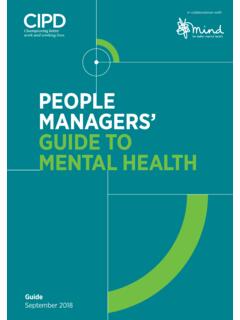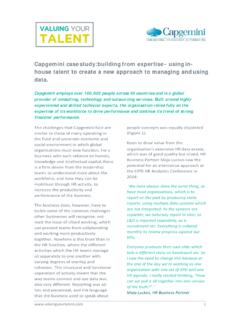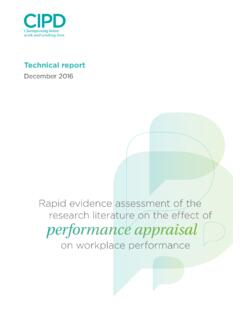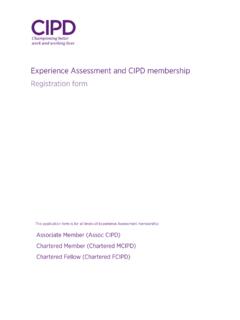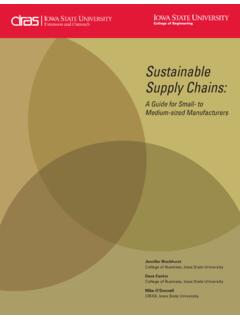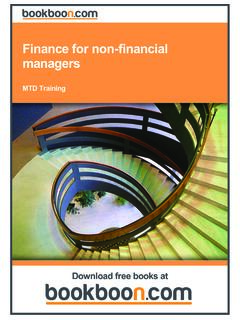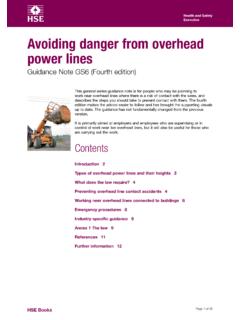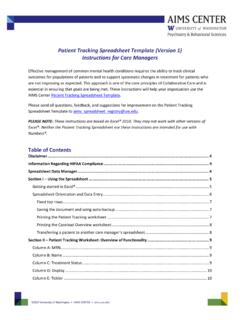Transcription of SUPPORTING EMPLOYEE RESILIENCE
1 SUPPORTING . EMPLOYEE . RESILIENCE . Guidance for line managers Guide March 2022. The CIPD is the professional body for HR and people development. The registered charity champions better work and working lives and has been setting the benchmark for excellence in people and organisation development for more than 100 years. It has more than 160,000 members across the world, provides thought leadership through independent research on the world of work, and offers professional training and accreditation for those working in HR and learning and development.
2 SUPPORTING EMPLOYEE RESILIENCE : guidance for line managers 1. Guide 2. SUPPORTING EMPLOYEE RESILIENCE : guidance for line managers 3. 4. Contents 1 Introduction to this guide 3. 2 manager behaviours that impact RESILIENCE 4. 3 Conclusion 8. 4 Useful resources 8. 1. SUPPORTING EMPLOYEE RESILIENCE : guidance for line managers Introduction to the line manager 1 support materials 2 Managers play a vital role in determining the health, wellbeing and engagement of their team. They also play an essential part in managing particular people management issues that arise in their team, such as bereavement, conflict, sickness absence and mental 3 health problems, which can have a negative impact on EMPLOYEE health, wellbeing and engagement if not well managed.
3 4 CIPD research identified five key behavioural areas that are important for line managers to support the health, wellbeing and engagement of those who work for them: Being open, fair and consistent Handling conflict and people management issues Providing knowledge, clarity and guidance Building and sustaining relationships SUPPORTING development A line manager 's behaviour and the culture they create in their team is the biggest influence on an EMPLOYEE 's work experience. Capability in these five behavioural areas, underpinned by an attitude of care, respect, compassion, wisdom and kindness, is vital for line managers to manage the health, wellbeing and engagement of their employees.
4 Such capability will also provide the foundation for line managers to manage particular people management issues and will enable managers to take a positive approach, recognise EMPLOYEE needs in these situations and manage them in ways that are sensitive, supportive and inclusive. The CIPD has created a range of support materials to help you adopt a management approach that supports good health, wellbeing and engagement in your team. Designed for anyone who manages people, the guidance and exercises are quick and easy to use. They can help you save time and get better results by managing people well all of which is good for your own wellbeing as well as that of your team.
5 To build on these resources, the CIPD has also created a series of guides focusing on specific areas of people management that aim to support managers in dealing with particular people management issues. Each of these guides provides practical information and advice relevant to that particular people management issue, as well as linking it to the approach covered in the support materials. The intention is that managers use the five key behavioural areas as the basis for managing all the issues, and draw on specific relevant behaviours from within the framework to help with the particular issue in question.
6 Look out for the icons to understand which of the behaviours is particularly relevant to the issues being discussed. 2. SUPPORTING EMPLOYEE RESILIENCE : guidance for line managers 1 Introduction to this guide 1 RESILIENCE is described as an individual's ability to recover from or stay well in the face of adversity. In a work setting, this translates into an EMPLOYEE having the capacity to thrive, 2 rather than just survive, in high-stress environments'. So, RESILIENCE helps employees adapt, cope, and respond positively to stressors in the workplace.
7 3 RESILIENCE is a mixture of a relatively stable personal attribute and a variable psychological state that is affected by the situation someone is in. Some people will naturally be more resilient than others, but the onus must not simply be put on employees to toughen up'. 4 and be' resilient. The context in which people are working, their colleagues, work content, working environment, and organisational factors will all affect their RESILIENCE . As a line manager , you play a crucial role in influencing how resilient your team members are, both because your behaviour affects employees' RESILIENCE and because you can influence a range of factors that affect your team members' RESILIENCE levels.
8 In the context of the challenging world of work, the ability of employees to cope with adversity and display RESILIENCE is essential to individual, team and organisational success and even survival. RESILIENCE helps employees protect and regain their personal resources at work, which in turn protects them from problems like psychological distress, emotional exhaustion and burnout. Research shows that RESILIENCE is linked not just to people's wellbeing and ability to deal with stress, but also their capacity to be proactive and creative at work, their performance on work tasks and the role they play in the organisation.
9 It also affects their engagement with and commitment to their work and employer. As a line manager , you will reap considerable benefits from SUPPORTING your team to be resilient, both through having fewer people management issues to deal with and through having a better-performing, more creative and thriving team. This guide is designed to help you, as a line manager , support your team members to be as resilient as possible. It will look at two ways in which you can fulfil this important aspect of your people management role: 1 How your behaviour as a manager directly affects your team members the top priority is for you to develop high-quality relationships with all team members.
10 In addition, there are a number of other behaviours that are important, including how you set goals, celebrate success, coach your team, help create a supportive environment and ensure that people know what to expect. 2 The range of other factors that are linked to RESILIENCE such as employees' confidence, optimism, sense of coherence and level of social support (identified in the CIPD. evidence review) and the key role you can play in creating the conditions that support employees with these. Both these aspects link closely with all the behavioural areas identified by CIPD research as important to support team health, wellbeing and engagement: Building and sustaining relationships is a central part of building RESILIENCE .
